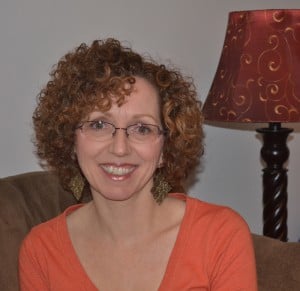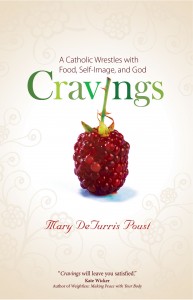Christopher Closeup Podcast – Guest: Mary DeTurris Poust
(This post is part of Mary DeTurris Poust’s “Cravings” blog tour.)
 Like a lot of people, Mary DeTurris Poust was a multitasker, used to mindlessly eating breakfast while reading emails on her laptop or focusing on the New York Times crossword puzzle. Then, while on a retreat that didn’t allow reading, writing, or talking, she was confronted by the mealtime dilemma, “It’s just me and my corn chowder. I’ve got to figure out what to do here.”
Like a lot of people, Mary DeTurris Poust was a multitasker, used to mindlessly eating breakfast while reading emails on her laptop or focusing on the New York Times crossword puzzle. Then, while on a retreat that didn’t allow reading, writing, or talking, she was confronted by the mealtime dilemma, “It’s just me and my corn chowder. I’ve got to figure out what to do here.”
That incident forced Mary to eat mindfully, even prayerfully, paying attention to each bite of food and how it tasted. It also helped lead to her new book, “Cravings: A Catholic Wrestles with Food, Self-Image, and God.”
Though Mary initially fell back into her old habits when she returned home, she made a conscious effort to follow through on what she learned. As she explained to me on Christopher Closeup, “I took everything off the table, lit a candle, and started to pray before I ate oatmeal. And so now I talk about it as my ‘mindful oatmeal.’ And I still try to do that practice every day…to do everything with that sense of reverence…It makes you full, not just in a physical way, but in a spiritual way.”
That spiritual approach led Mary to ask herself some hard questions about her own self-image and how it was tied to snacking, even when she wasn’t hungry. Despite the fact that she leads a fulfilling life as a wife, mother, author and award-winning newspaper columnist, she would still find herself looking in the mirror sometimes and thinking, “I’m not good enough” because of a couple of extra pounds.
She said, “I’ve struggled with food, and I’ve struggled with my own view of myself in terms of whether I’m worthy enough or good enough. It is connected to God in a deep way. When you start diving down deep, we use [food] to fill a void in our lives. It’s usually a hunger for something deeper.”
The knowledge proclaimed in Psalm 139, that we are all loved and “wonderfully made” by God, made a profound difference in Mary’s understanding of herself. She said, “You hear about these New Age-y affirmations where you’re supposed to tell yourself how good you are. I have a really hard time with that. But when I get back to the Scripture, that resonates a little bit more with me—because it’s not just me saying I’m great; it’s God speaking that to me. And that was sort of a moment for me…coming to terms with the fact that we are loved just as we are. That doesn’t mean we don’t try to improve and eat healthier and exercise and things like that, but that we are loved whether we are ten pounds heavier than we want to be right now or not.”
Mary acknowledges that Catholics themselves have contributed to the problem by sometimes treating healthy self-esteem and concern with your appearance as the sin of pride. During her childhood, she absorbed the view that she wasn’t supposed to care too much about her body because that’s an obstacle to spiritual health. The reality of Catholic teaching, Mary later discovered, was very different.
She said, “The Catechism talks about taking care of your body, the temple of the Holy Spirit…I was on a retreat with a priest who was saying that we have this Incarnational faith. God became human, and therefore the body can’t be bad because it’s at the center of this. We often shy away from that idea – that mind, body, spirit connection – because it seems not of our faith. And yet, it is. We can own it and not have to fear that it’s something sort of New Age-y. Mind, body, and spirit are all connected and we have to go to God with our whole self, and not just a piece of us. ”
 Mary is well aware that this is an important message to pass down to her own daughter who, two years ago at the age of 10, put on a coat and asked, “Does this make me look fat?”
Mary is well aware that this is an important message to pass down to her own daughter who, two years ago at the age of 10, put on a coat and asked, “Does this make me look fat?”
Mary was shocked because her daughter only weighed about 60 pounds at the time: “Yet somewhere in her brain, she’s already got that [insecurity] because there are all of these TV shows and magazines that make everybody look so glamorous and thin….But even the most beautiful people on the magazine have been airbrushed or photo shopped to make them thinner, to make them more perfect. So I think we do have to talk, especially to our girls, about the fact that they’re beautiful just the way they are. Yet oftentimes, it will be my husband who reminds me when I say something about myself, that that is probably the more powerful message she’s gonna hear. If she hears me saying I don’t like the way I look in something, do I look fat in this, that’s gonna be really powerful. And sometimes I forget that. The magazines are really bad, but mothers also have to be careful of the messages they’re giving to their daughters by the way we live.”
As the books’ subtitle suggests, “Cravings” will leave you with helpful messages about “food, self-image, and God” that can influence every aspect of your life. So take the time to do some thoughtful reading about mindful eating.
(ENTER TO WIN A $100 WILLIAMS-SONOMA GIFT CARD AT THIS LINK.)
To listen to my full interview with Mary DeTurris Poust, click the podcast link:
Christopher Closeup Podcast – Guest: Mary DeTurris Poust












